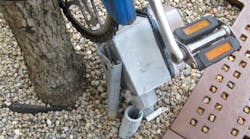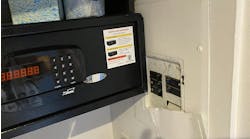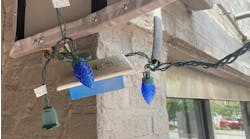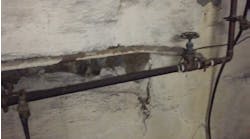Bike Kickstand with a Potential Extra Kick
In this city street location, people are using the trees adjacent to the sidewalk as a bike stand. As you can see in this close-up photo, the bike pedals are causing severe damage to this electrical box. Note the exposed conductors showing between the nonmetallic tubing and the box connector. This situation could easily lead to an electrical accident where the entire bike could become a current-carrying conductor.
It’s obvious this equipment is installed with a lack of proper protection from physical abuse. In addition, if these conductors are routed through ENT, then we could cite a violation of 362.12. ENT shall not be used for direct earth burial; where exposed to the direct rays of the sun, unless identified as sunlight resistant; or where subject to physical damage.
Separation Anxiety
While recently purchasing some new tools in a hardware store, I noticed this broken ½-in. EMT coupling in this run of thin wall tubing, which enclosed the 120V circuit conductors feeding a receptacle near the checkout counter. Apparently, skids of water had been stored in front of this connection in the past and were probably the cause of the damage here. Upon closer examination, I could see that an arc had occurred at the coupling. When I brought this to the attention of the store manager, he gruffly replied, “It will be fixed!”
A few days later, I stopped by the store again. Nothing had been done to correct the situation. This time, I asked if I could speak with the store electrician. He agreed that there was a problem and that he would call the electrician who normally services this store. Let’s hope he follows through on the repair, unlike his boss.
As noted in 300.10 [Electrical Continuity of Metal Raceways and Enclosures], “Metal raceways, cable armor, and other metal enclosures for conductors shall be metallically joined together into a continuous electrical conductor and shall be connected to all boxes, fittings, and cabinets so as to provide effective electrical continuity. Unless specifically permitted elsewhere in this Code, raceways and cable assemblies shall be mechanically secured to boxes, fittings, cabinets, and other enclosures.”



